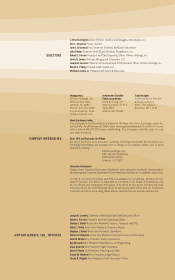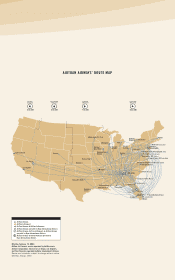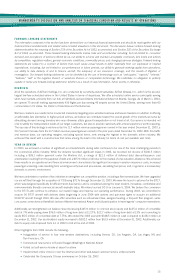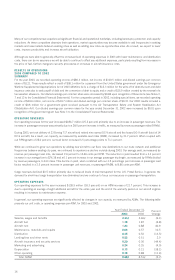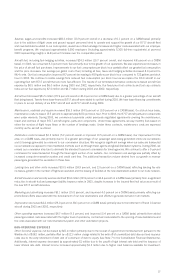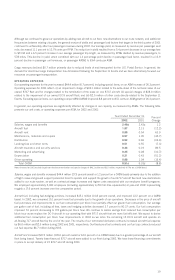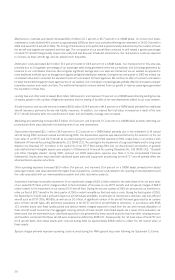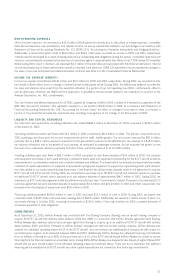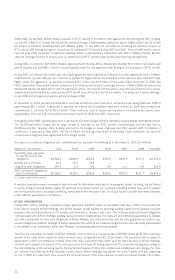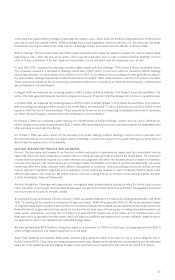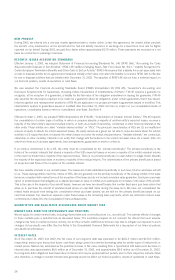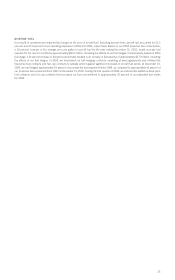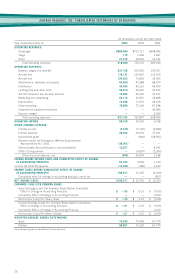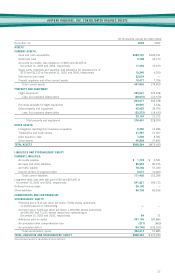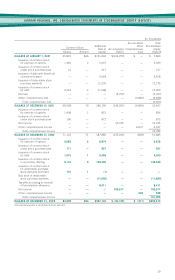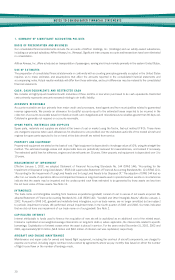Airtran 2003 Annual Report Download - page 22
Download and view the complete annual report
Please find page 22 of the 2003 Airtran annual report below. You can navigate through the pages in the report by either clicking on the pages listed below, or by using the keyword search tool below to find specific information within the annual report.Maintenance, materials and repairs decreased $21.4 million (31.1 percent or 45.7 percent on a CASM basis). On a block hour basis,
maintenance costs declined 40.0 percent to approximately $200 per block hour, primarily reflecting the retirement of 14 DC-9 aircraft in
2002 and seven DC-9 aircraft in 2001. The timing of maintenance to be performed is predominantly determined by the number of hours
the aircraft and engines are operated and their age. The composition of our aircraft fleet continued to shift toward a greater percentage
of new B717 aircraft that generally require less costly and less frequent scheduled maintenance. Our maintenance costs are expected
to increase as these aircraft age and are utilized more frequently.
Distribution costs decreased $2.3 million (5.0 percent overall or 24.6 percent on a CASM basis). Our improvement in this area was
primarily due to: (i) a greater percentage of our passenger sales being generated online via our website; and (ii) savings generated by
revisions to our commission structure. We recognize significant savings when our sales are transacted via our website as opposed to
more traditional methods such as through travel agents and global distribution systems. During the second quarter of 2002 we revised our
commission structure to eliminate the standard 5 percent commission for travel agencies. We continue to offer a 5 percent commission
for sales transacted through the travel agent section of our website. Our commission cost savings was partially offset by increased computer
reservation system and credit card fees. The additional transaction volume derived from our growth in revenue passengers generated
the escalation in these fees.
Landing fees and other rents increased $6.6 million (18.6 percent, and improved 7.3 percent on a CASM basis) reflecting landing fee rate
increases, growth in the number of flights we operated and the leasing of facilities at the new destinations added to our route network.
Aircraft insurance and security services increased $16.8 million (134.4 percent or 89.5 percent on a CASM basis) primarily from additional
aircraft insurance premiums for war risk liability insurance. In addition, our insured fleet hull value increased as a result of the new
B717 aircraft deliveries while the overall rates for basic hull and liability coverage also increased.
Marketing and advertising increased $2.5 million (13.5 percent, and improved 10.7 percent on a CASM basis) primarily reflecting our
promotional efforts associated with the development of our new destinations.
Depreciation decreased $11.1 million (39.4 percent or 51.2 percent on a CASM basis) primarily due to the retirement of 14 owned
aircraft during 2002 and seven owned aircraft during 2001. Our depreciation expense was reduced further by the reduction in the net
book value of our B737 and DC-9 aircraft as recorded during the second and third quarters of 2001, respectively, in accordance with
Statement of Financial Accounting Standards No. 121 (SFAS 121), “Accounting for the Impairment of Long-Lived Assets and for Long-Lived
Assets to be Disposed Of.” A revision to the useful life of our B717 fleet during 2001 and our discontinued amortization of goodwill
and indefinite-lived intangible assets upon adoption of Statement of Financial Accounting Standards No. 142 (SFAS 142), “Goodwill
and Other Intangible Assets,” during 2002, reduced our 2002 depreciation expense (see Note 2 to the Consolidated Financial
Statements). Depreciation associated with additional spare parts and equipment provisioning for the B717 aircraft partially offset the
aforementioned expense reductions.
Other operating expenses increased $5.0 million (7.4 percent, and improved 15.4 percent on a CASM basis) primarily from added
passenger related costs associated with the higher level of operations, contractual costs related to the opening of new destinations and
the costs associated with our new reservations system and other automation projects.
Impairment loss/lease termination represents: (i) an impairment charge of $18.1 million related to the write-down of the net book value
of our owned B737 fleet and for charges related to the termination of the lease on one B737 aircraft; and (ii) special charges of $28.0
million related to the impairment of our owned DC-9 aircraft fleet. During the second quarter of 2001 we announced our intentions to
retire our fleet of B737 aircraft in the third quarter of 2001 in order to simplify our fleet and reduce costs. During the third quarter of 2001,
the September 11 Events had a profound impact on aircraft values worldwide, in particular on maintenance-intensive, less fuel-efficient
aircraft such as B737-200s, MD-80s, as well as our DC-9 fleet. A significant number of the aircraft that were grounded by air carriers
were of these aircraft types. We performed evaluations of the B737 and DC-9 aircraft fleets to determine, in accordance with SFAS
121, whether future cash flows (undiscounted and without interest charges) expected to result from the use and eventual disposition of
these aircraft would be less than the aggregate carrying amount of these aircraft and related assets. As a result of the evaluation, we
determined that the estimated future cash flows expected to be generated by these aircraft would be less than their carrying amount,
and therefore concluded that these aircraft were impaired as defined by SFAS 121. Consequently, the net book value of the B737 and
DC-9 aircraft fleets and related assets were reduced during 2001 by approximately $38.8 million to reflect the fair market value of
these assets.
Special charges primarily represent operating costs incurred during the FAA’s ground stop order following the September 11 Events.
20


